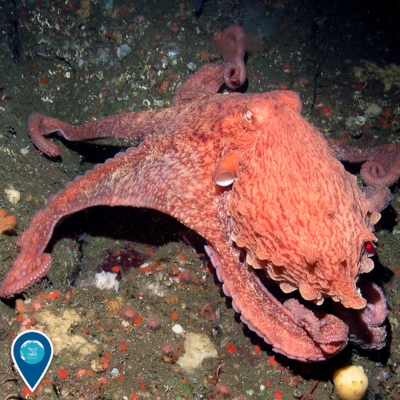The Giant Pacific Octopus: Wizard Beneath the Waves
You needn’t venture far below the surface of the sea to encounter some of nature’s more bizarrely designed and marvelously adapted life forms. One such is a multi-limbed, blue-blooded, squishy-bodied, consummately clever master of disguise; a supreme contortionist, a formidable predator, and a fiercely protective parent. Meet the giant Pacific octopus, Enteroctopus dofleini. They hail from an impressive family.
A word about octopuses in general: Octopuses are cephalopod (head-footed) molluscs: marine invertebrates with two eyes, three hearts, four pairs of arms and nine brains. Their mouths are at the nexus of their arms (tentacles). They are 90% muscle, but can relax and squeeze through tiny openings, limited only by the size of their beak. The octopus’ muscular but supple body can squeeze into cracks and crevices in which it conceals itself – its disappearing act - for either ambush or self-preservation. A 50 lb. octopus can push itself through a two-inch hole; the size limited only by its hard beak. These creatures are capable of blending into a landscape in a heartbeat. Color-changing chromatophores in its skin, even reflective cells that seem to render it invisible, create near-perfect camouflage and concealment. Now you see it … now you don’t.
An octopus is a true “blue-blood,” courtesy of hemocyanin, a copper-rich pigment that binds oxygen at great depths. Two of its hearts pump blood to its gills, while a third heart circulates blood elsewhere throughout its body.
The Einstein of Invertebrates: Among all the invertebrates – marine and terrestrial - the octopus is among the most intelligent, most behaviorally diverse. It boasts the most complex brain. Its nervous system consists of about 500,000,000 neurons, with two-thirds of them located in the octopus’ arms. This permits each arm to move and otherwise function autonomously from the “head” brain located in the main body. This is due to the fact that neurons in the octopus brain are arranged in lobes that are far more specialized than simple ganglia – a quite sophisticated adaptation. It has a retentive memory and can learn quickly – to solve puzzles, to quickly assess and adapt to changing situations.
Octopuses are found worldwide: in pelagic waters, coral reefs, and on the deep ocean floor. Sometimes, even shipwrecks! For defense against predators, they expel ink, flash colors to confuse and alarm, jet quickly away from danger, or hide in inaccessible crannies. All are venomous to some degree. More than 300 species of octopus are currently recognized.
Giant Pacific Octopus: The giant Pacific octopus, Enteroctopus dofleini, ranges from Japan, across the North Pacific and south to Mexico, living in water temperatures around 50-52° F. Nocturnal predators, they feed mainly on crabs, clams, abalone, scallops, fish; but they sometimes will attack each other. This species may be found in tide pools, kelp forests, and deep rocky habitats. Of all the octopuses, it grows bigger and lives longer than any other. The largest recorded was nearly 600 lbs., its arms stretching nearly 30 ft. across and weighing over 600 pounds. Adults more commonly average 16 feet and 110 lbs.
Giant Pacific octopuses pursue a “live fast and die young” philosophy. They grow rapidly; they must. These creatures rarely live beyond four or five years, both sexes dying soon after breeding. Females will live only long enough to tend their eggs, fiercely defending them against predators, but they fast all the while. Left with no reserves, they die soon after the brood of eggs hatches, after nearly two months.
These animals occupy a unique ecological niche, able to live and thrive at extreme conditions where others could not survive: truly remarkable creatures.
Photos Credit: NOAA








